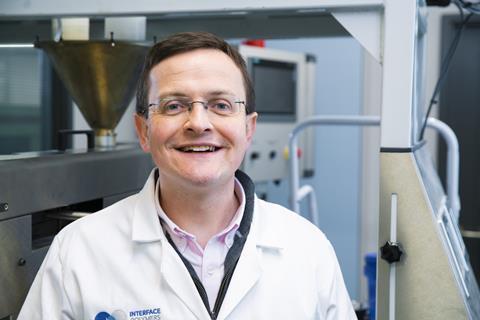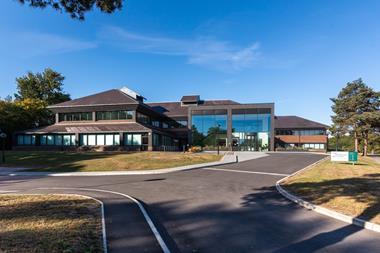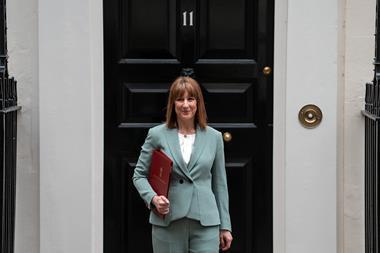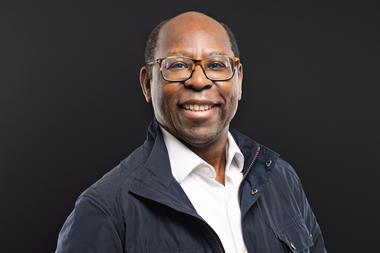What’s the point of knowledge generation if we’re not creating high value jobs, asks Chris Kay

From spending his PhD at Warwick University looking for a simple way to make polymers, to spinning out and scaling up his own company, Interface Polymers, Chris Kay has come a long way. But the journey has been anything but straightforward.
Despite finding a product that will fill substantial unmet need across the world, the lack of suitable facilities has made scaling up within the UK unworkable. The company eventually decided to set up a pilot plant in India.
‘It’s taken us 10 years [to get to this point] in part because, as a nation [the UK is] not very well set up for this stuff today,’ says Kay.
Kay set up Interface Polymers (IPL) with Peter Scott, a chemistry professor at Warwick University. It has grown to a team of 18, and is commercialising two Polarfin products based on diblock copolymers. By bridging two polymer molecules together, they allow different types of plastics to be joined together more strongly. One is a an additive that improves the properties (and hence value) of mixed-material recycled plastics, while the other is a surface coating on polypropylene that makes it stick to common adhesives.
Kay says the company has gone through a ‘pretty classic deep tech journey’ – raising money, setting up a lab to develop the products, and hiring a small business development team to find real-world problems to solve. For the last few years, IPL was ready to move on to the next step of the manufacturing journey: building a dedicated pilot plant to make materials on a larger scale. But this is where they met significant barriers.
There is money and support out there, like Innovate UK… but it’s hard work
The team initially visited the Centre for Process Innovation (CPI) in the northeast of England. ‘On paper, Teesside is where you might have done this in the UK,’ explains Kay. But while CPI has a great operation in aspects of food and medical technology, energy systems and pharmaceuticals, it was not equipped to do what IPL needed at the time. Eventually they concluded that the technological fit was not right.
After that they went much further afield, to an ex-Dow Chemical site in Charleston, US, but found it extortionately expensive. ‘It was designed for this sort of scale up and pilot plant type work. But we spent a lot of precious seed capital making a couple of hundred kilos. At one point, we had about eight engineers that we were funding in the US, at $200–300 an hour per engineer.’ While they learned a lot, ‘it cost us a fortune,’ he says.
They explored options in Norway and Finland before one of their shareholders recommended looking in India. They were introduced to the chief executive of a small chemical business there and the decision was quickly made that they would build the plant, and that they would also invest in IPL. They had found a partner that understood the business, with the capability to do the job and the confidence to get involved in a strategic investment.
Kay says it has been ‘challenging’ working between the UK and India. ‘[In manufacturing] you think about quality, speed and cost. We definitely got speed – the plant was built within six months,’ he says. On the cost side, they came to a deal that was good for everyone. But with a new technology and process, there is always a learning curve, which geographic separation doesn’t help – it takes at least 24h to get between the two sites. ‘We are doing great quality control in India, but we’re still at the stage where we want to be trialling stuff [in the UK] and making sure it works in application testing. It just slows everything down.’
In the UK, we talk big about advanced manufacturing. But if we’re really serious about that, we need to be placing much bigger bets
Kay’s experience is far from unique, and he is now committed to enabling other start-ups to grow and achieve in five years, what ultimately took him 10. ‘[I want to share] my experiences in the US, in other European countries, and now, ultimately, with India.’
However, he says there needs to be a proper pipeline system in place for start-ups that could provide them with facilities and guide them through the scale-up journey. This exists in pockets around the country – such as ScienceCreates in Bristol, Kay says – but it needs to be all across the UK.
‘There is money and support out there, like Innovate UK… but it’s hard work,’ he says. Making repeated applications takes a lot of time and effort for pots of money that, while helpful, are relatively small in the context of the chemical industry.
‘If you’re serious about building a business that’s going to be turning over hundreds of millions, you’ve got to make educated bets of a larger size to have a chance of delivering on a larger scale. ‘In the UK, we talk big about advanced manufacturing. But if we’re really serious about that, we need to be placing much bigger bets than we currently do.’
Kay says, that as a nation, the UK is ‘very good’ at inventing. ‘But what’s the point of all this knowledge generation, all the funding and taxpayer money, if we’re not going to take it at least one or two steps further to turn those inventions into lots of high value jobs?’
Editorial note: This article was updated on 25 April 2025 to remove commercially sensitive information and clarify factual details
Additional information
Chris Kay is part of the RSC’s Change Makers Venture Acceleration Programme which provides support to deep tech chemistry startups. Through Change Makers, in addition to receiving acceleration support, Chris has shared his experience and contributed to the More ChemLabs initiative to help the next generation of entrepreneurs

















No comments yet